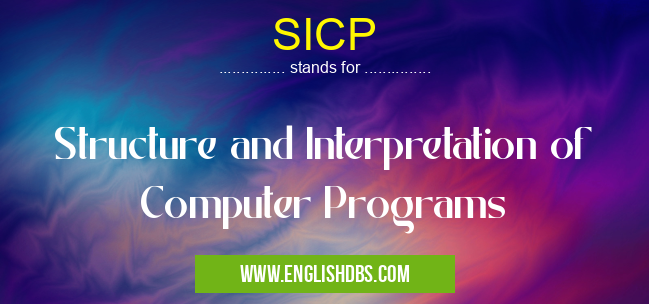What does SICP mean in UNIVERSITIES
SICP stands for Structure and Interpretation of Computer Programs. It is a computer science textbook that was written in 1985 by Gerald Jay Sussman and Hal Abelson, both of whom are professors at the Massachusetts Institute of Technology (MIT). The book is known to be one of the most influential works in the field, being used as an introductory text for many universities around the world. This book helps students understand the fundamentals of programming logic, algorithms, and software design. SICP serves as a foundational text for those studying computer science or software engineering, with its focus on abstract models and principles which can be applied across multiple programming languages.

SICP meaning in Universities in Academic & Science
SICP mostly used in an acronym Universities in Category Academic & Science that means Structure and Interpretation of Computer Programs
Shorthand: SICP,
Full Form: Structure and Interpretation of Computer Programs
For more information of "Structure and Interpretation of Computer Programs", see the section below.
Explanation
The Structure and Interpretation of Computer Programs (SICP) establishes a unique approach to teaching computer science concepts by exploring how different representations can impact thinking about programming. It introduces students to symbolic programming language to think about their programs in new ways, away from the linear structure imposed by other languages. This approach allows students to think more abstractly about their code and develop strategies for constructing larger systems leveraging existing components. The book looks deeply into important topics such as recursion, data abstraction, streaming data flow processing, hierarchy-based rule systems, resource control models, higher-order functions for combining programs into systems using macros and modules. The teaching approach found in SICP is often cited as being particularly effective when compared with other introductory texts due to its use of metaphors and analogies to help explain difficult topics. Rather than simply providing a series of syntax rules or definitions for concepts like loops or variable bindings it attempts to break down complex topics into component parts by comparing them with everyday life objects or familiar ideas such as cars or libraries. Not only does this make these topics easier to grasp but it also makes it easier to visualize how they work which can be especially helpful when creating large programs with complex interactions between multiple components.
Essential Questions and Answers on Structure and Interpretation of Computer Programs in "SCIENCE»UNIVERSITIES"
What is SICP?
SICP stands for Structure and Interpretation of Computer Programs, a computer science textbook written by Harold Abelson, Gerald Jay Sussman and Julie Sussman. It is often used as the primary textbook in introductory level programming courses.
Is SICP still relevant today?
Absolutely! SICP covers fundamental topics such as programming languages, data structures, abstraction techniques, software engineering principles, and more that are still essential knowledge in the fields of computer science and software engineering.
What is the Structure and Interpretation of Computer Programs about?
The book describes fundamental principles of computing that apply regardless of specific language or technology used; it uses Scheme for the examples and exercises. The authors emphasize design strategies that enable readers to create modular programs that are understandable, adaptable to change, extensible for new purposes, and able to interact well with other systems.
Who wrote the Structure and Interpretation of Computer Programs textbook?
The Structure and Interpretation of Computer Programs was written by Harold Abelson, Gerald Jay Sussman and Julie Sussman.
What topics does the Structure and Interpretation of Computer Programs cover?
The textbook covers many fundamental concepts in computer science such as programming paradigms, data abstraction techniques, computation models, software engineering principles and more.
Does the book provide example code?
Yes! All code examples are provided in Scheme (a popular Lisp-dialect). Students can use these code examples to help them understand how different programming techniques work.
Is there an online version of Structures & Interpretations of Computer Programmes?
Yes! An open-source HTML version is available online at https://mitpress.mit.edu/sicp/full-text/book/book.html.
Does Structure and Interpretation point out a special way to think about programming languages?
Yes - one of its main goals is to show how understanding symbols can be powerful when analyzing problems or creating algorithms.
What type of language does Structure & Interpretations teach?
Although some parts refer to specific languages (like Scheme), most of its content focuses on methodologies that can be applied regardless of language or technology used.
Final Words:
In conclusion, SICP provides an excellent foundation knowledge base for those looking to gain a better understanding of computer science concepts and ideas related to software engineering. By utilizing metaphors and analogies, the authors provide insights which enable readers to think more abstractly about programming challenges while also helping them develop strategies for breaking down larger tasks into manageable pieces. This makes SICP an invaluable resource for novice programmers looking to get started in computer science as well as experienced developers seeking improved techniques when tackling difficult challenges with their code.
